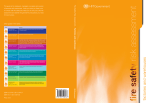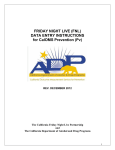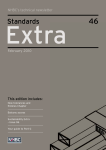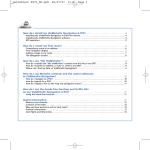Download Lawful Development Certificates: A User's Guide
Transcript
Lawful Development Certificates A User’s Guide www.communities.gov.uk community, opportunity, prosperity Lawful Development Certificates A User’s Guide December 2007 Communities and Local Government: London Department for Communities and Local Government Eland House Bressenden Place London SW1E 5DU Telephone: 020 7944 4400 Website: www.communities.gov.uk © Crown Copyright 2007 Copyright in the typographical arrangement rests with the Crown. This publication, excluding logos, may be reproduced free of charge in any format or medium for research, private study or for internal circulation within an organisation. This is subject to it being reproduced accurately and not used in a misleading context. The material must be acknowledged as Crown Copyright and the title of the publication specified. Any other use of the contents of this publication would require a copyright licence. Please apply for a Click-Use Licence for core material at www.opsi.gov.uk/click-use/system/online/pLogin.asp or by writing to the Office of Public Sector Information, Information Policy Team, St Clements House, 2-16 Colegate, Norwich NR3 1BQ. Fax: 01603 723000 or email: [email protected]. If you require this publication in an alternative format please email [email protected] Communities and Local Government Publications PO Box 236 Wetherby West Yorkshire LS23 7NB Tel: 0870 1226 236 Fax: 0870 1226 237 Textphone: 0870 1207 405 Email: [email protected] or online via the Communities and Local Government website: www.communities.gov.uk December 2007 Product Code: 07COMM04962 Lawful Development Certificates | 3 Contents Introduction 4 The purpose of the Lawful Development Certificate system 4 What a certificate does 5 Making an application 6 Fees for applications 6 If your application is refused 6 Your appeal costs 7 Converting an ‘established use’ certificate (EUC) into a lawful development certificate (LDC) 7 Offences 7 Possible revocation of a certificate 7 The address for appeal forms 8 Appendix: The statutory appeal provisions 9 4 | Lawful Development Certificates Introduction This guide is intended only to give advice. It is not an authoritative statement of the law. If you need more advice, please contact you local council’s planning department. 1. This user’s guide is intended to help anyone who is thinking of applying for a ‘lawful development certificate’ or who wishes to appeal against the planning authority’s decision on a certificate application. 2. The system of ‘lawful development certificates’ enables local planning authorities, when the appropriate conditions are satisfied in each case, to grant a certificate saying that: (1) an existing use of land, or some operational development, or some activity in breach of a planning condition, is lawful; or (2) a proposed use of buildings or other land, or some operations proposed to be carried out in, on, over or under land, would be lawful. More detailed advice about these provisions is in DETR Circular 10/97 which is available from The Stationery Office. 3. This system is based on provisions in Part VII of the Town and Country Planning Act 1990, as amended by the Planning and Compensation Act 1991. It works together with other provisions in the Act which enables the local planning authority to control or stop unauthorised development of land in their area. This wide procedure is called enforcing planning control. A lawful development certificate cannot be granted if the planning authority are entitled to take an enforcement action within the strict time-limits specified in Part VII of the Act. The purpose of the Lawful Development Certificate system 4. This system provides the possibility of obtaining a statutory document confirming that the use, operation or activity named in it is lawful for planning control purposes on the dates specified in the document. Once it is granted, the new type of certificate remains valid for the use or development described in it, on the land it describes, provided there is no subsequent material change in the circumstances – see paragraphs 6 and 8 below. 5. The grant of a certificate applies only to the lawfulness of development carried out, or proposed, in accordance with the Planning legislation. It does not remove the need to comply properly with any other legal requirements, such as consents required under the Building Regulations, the Wildlife and Countryside Act 1981, or the Listed Building and Conservation Areas Act 1990. These are only some examples. If in doubt, please check with the local council. Lawful Development Certificates | 5 What a certificate does 6. A certificate granted for an existing use, operation or activity will specify (by reference to a plan or drawing) the area of land included in the certificate and describe the precise nature of the use, operation or activity which is certified as lawful. The certificate will not protect you from enforcement action by the planning authority if you subsequently change the specified use ‘materially’ without making a planning application for it. For example, a certificate may specify that a haulage contractor’s site can be used lawfully for the parking of a defined number of heavy goods vehicles, of a specified capacity or size, and specify the areas of the site which have been used for vehicle maintenance purposes; or it may specify the area used for the storage of pallets and the maximum height to which they are to be stacked; or it may specify the hours during which any operations have taken place on the site. Any significant change from what is specified may result in some enforcement action against it. 7. A certificate granted for a proposed use or operation will describe the precise use or operation on a site in the terms considered permissible without the need to make a planning application for it. 8. The certificate will always give reasons why the use, operation or activity is, or would be, lawful. It will conclusively establish the lawfulness of the use, operations or activity covered by the certificate. A certificate granted for an existing use, operation or activity will not protect future development on the site. For example, an extension to an existing building described in the certificate, or the intensification of an existing use will not be covered. A certificate granted for a future use or operation will protect future development but only if that future development is as described in the certificate and undertaken before there is any material change in relevant circumstances. If the limitations specified in a certificate are exceeded, the landowner or occupier may be liable to enforcement action by the planning authority for any resulting breach of control. 9. You may apply for a certificate if you wish to find out whether any proposed development which would otherwise be ‘permitted development’ (by virtue of provisions in the General Permitted Development Order) requires the submission of a planning application and what is called an ‘environmental assessment’. You may also apply in order to find out whether there are any special restrictions on proposed development because land is, or is near to, a Site of Special Scientific Interest, a Special Protection Area (under the European Community’s Birds Directive), and a Special Area of Conservation (under the European Community’s Habitats Directive), and your proposal may have a significant effect on the site. 6 | Lawful Development Certificates Making an application 10. Your certificate application should be made in writing. It must provide sufficient factual information for the authority to decide the application. You and your agent are responsible for providing the necessary information. Without sufficient or precise enough information, the authority will be justified in refusing a certificate. This does not preclude another application if you can produce more information later on. Most authorities will provide an application form. Alternatively from 6 April 2008, the Standard Application Form can be accessed by the applicant directly from: www.planningportal.gov.uk. By fully completing any form, you will help the authority in considering your application, and may avoid being asked for more details. 11. An application must specify in reasonably precise terms what the use, operational development, or other activity is, or is proposed to be. The authority need not consider any proposal which does not include specific details of what it involves. Nor need they answer general questions on what could be undertaken on the land or what is lawful. The planning merits of the use, operation or activity in the application are not relevant. The issue of a certificate depends entirely on factual evidence about the history and planning status of the building or other land and the interpretation of any relevant Planning law or judicial authority. Fees for applications 12. You will have to pay a fee to the authority when your application is made. These fees are broadly linked to the fee payable for a planning application. In brief (although there are exceptions) the fees are: (1) for an application for the existing use of land of operational development not supported by an ‘established use’ certificate, the same as for an equivalent planning application; (2) for an application for a proposed use of buildings or other land or any operations proposed to be carried out in, on, over or under land, half of the fee for an equivalent planning application. The fees are set out in Regulations and the planning authority will be able to tell you what fee is required for your application. If your application is refused 13. If a properly made application is wholly or partly refused, or it is granted in a different form from the application, or is deemed to have been refused (because the authority have not determined the application within the timelimit of eight weeks of receiving the completed application), you can appeal to the Secretary of State for Communities and Local Government. The Appendix Lawful Development Certificates | 7 gives the full text of the statutory provisions for an appeal to the Secretary of State against a refusal, or deemed refusal, of a certificate application. Appeal forms are obtainable from the address given on page 8 of this booklet. By properly completing an appeal form, you will help to ensure that your appeal is dealt with quickly. 14. The Secretary of State may decide to dismiss an appeal, or allow it (wholly or partly) and grant a certificate. This decision may be challenged in the High Court by the appellant or the planning authority, but only on a point of law. Your appeal costs 15. As in other planning appeals, the parties to this type of appeal are normally expected to meet all their own appeal expenses. Costs will only be awarded, if an application is made, against a party who has acted ‘unreasonably’. They may be awarded whether the appeal has proceeded by written representations or by local enquiry. DOE Circular 8/93, available from The Stationery Office gives more detailed guidance about appeal costs. Converting an ‘established use’ certificate (EUC) into a lawful development certificate (LDC) 16. If you already have an existing ‘established use’ certificate, you may wish to convert it into a useful new certificate. To do so, an application must be made in the normal way. Offences 17. It is a serious offence to make a false or misleading statement, use a false or misleading document, or withhold any material information, in order to obtain a certificate. On summary conviction of this offence, the maximum penalty is a fine not exceeding £5,000. On conviction on indictment in the Crown Court, the maximum penalty is two years imprisonment, or an unlimited fine, or both. Possible revocation of a certificate 18. If a false statement is made or document used, or any material information is withheld, the planning authority can revoke a certificate. The revocation of a certificate may make the owner or occupier liable to immediate enforcement action to remedy what will then usually be a breach of planning control. 19. There is no appeal to the Secretary of State against an authority’s decision to revoke a certificate. But the decision may be contested in the High Court on the ground that the authority acted unreasonably in making the decision. For 8 | Lawful Development Certificates this purpose, legal action in the Court must usually start within three months of the decision. You are strongly advised to consult a lawyer before taking any legal action in the Court. The address for appeal forms The Planning Inspectorate PO Box 326 Temple Quay House 2 The Square Temple Quay Bristol BS99 7XF Tel: 0117 372 8213 Fax: 0117 372 8782 [email protected] Lawful Development Certificates | 9 Appendix: The statutory appeal provisions Appeal provisions of sections 195 and 196 of the Town and Country Planning Act 1990, as amended by paragraphs 32 and 33 of Schedule 7 to the Planning and Compensation Act 1991 and paragraph 4 of Schedule 4 to the Planning (Consequential Provisions) Act 1990. Appeals against refusal or failure to give decision on application 195 (1) Where an application is made to a local planning authority for a certificate under section 191 or 192 and: (a) the application is refused or is refused in part, or (b) the authority does not give notice to the applicant of their decision on the application within such period as may be prescribed by a development order or within such extended period as may at any time be agreed upon in writing between the applicant and the authority, the applicant may by notice appeal to the Secretary of State. (2) On any such appeal, if and so far as the Secretary of State is satisfied: (a) in the case of an appeal under subsection (1)(a), that the authority’s refusal is not well founded, or (b) in the case of an appeal under subsection (1)(b), that if the authority had refused the application its refusal would not have been well founded, She shall grant the appellant a certificate under section 191 or, as the case may be, section 192 accordingly or, in the case of a refusal in part, modify the certificate granted by the authority on the application. (3) If and so far as the Secretary of State is satisfied that the authority’s refusal is or, as the case may be, would have been well founded, she shall dismiss the appeal. (4) References in this section to a refusal of an application in part include a modification or substitution of the description in the application of the use, operations or other matter in question. (5) For the purposes of the application of section 288(10)(b) in relation to an appeal in the case within subsection (1)(b) it shall be assumed that the authority decided to refuse the application in question. (6) Schedule 6 applies to appeals under this section. 10 | Lawful Development Certificates Further provisions as to references and appeals to the Secretary of State 196 (1) Before determining an appeal to her under section 195(1) the Secretary of State shall, if either the appellant or the local planning authority so wish, give each of them an opportunity of appearing before, and being heard by, a person appointed by the Secretary of State for the purpose. (2) Where the Secretary of State grants a certificate under section 191 or 192 on such an appeal, she shall give notice to the local planning authority of that fact. (3) The decision of the Secretary of State on such an appeal shall be final. (4) The information which may be prescribed as being required to be contained in a register kept under section 69 shall include information with respect to certificates under section 191 or 192 granted by the Secretary of State. (8) Subsection (5) of section 250 of the Local Government Act 1972 (which authorises a Minister holding an inquiry under that section to make orders with respect to the costs of the parties) shall apply in relation to any proceedings before the Secretary of State on an appeal under section 195 as if those proceedings were an inquiry held by the Secretary of State under section 250.























